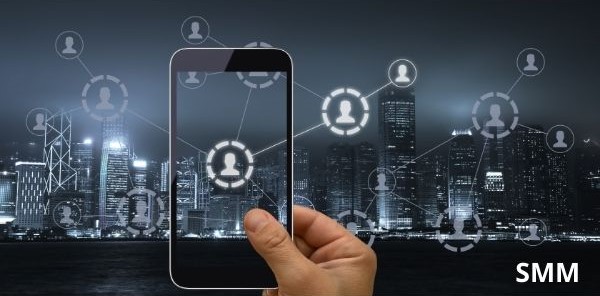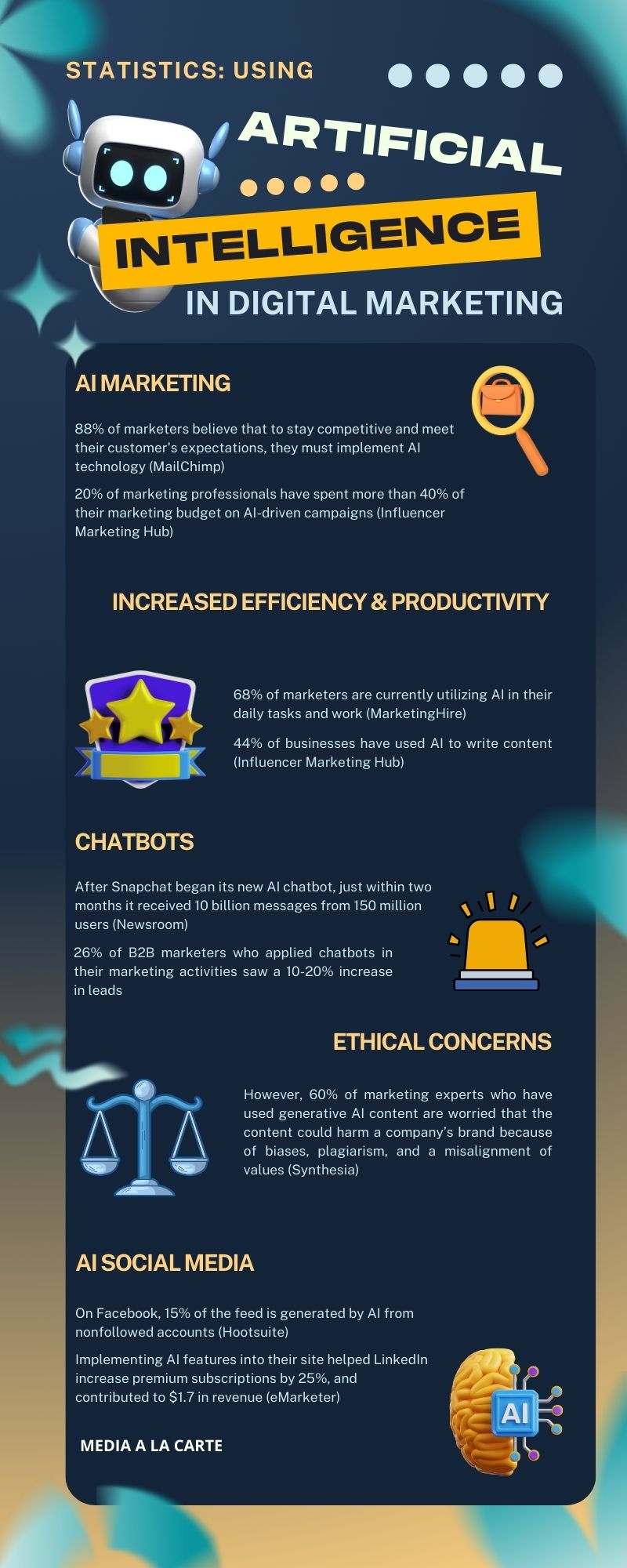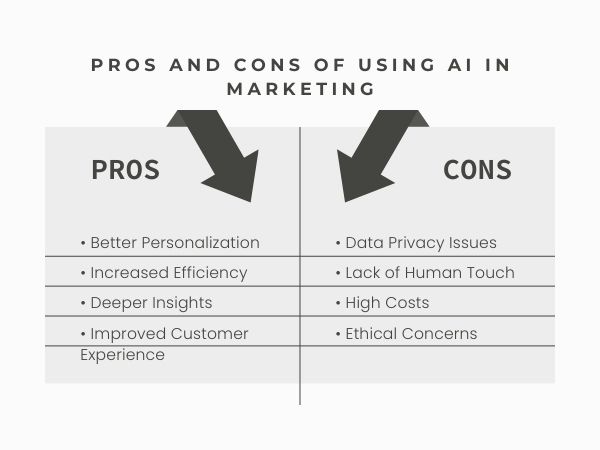
How to use ai in marketing
How to Use AI in Marketing: Boost Your Strategy & Drive Results
What is AI?
When discussing the use of artificial intelligence in marketing, we have to define ai first. Before,we dive deeper, it’s essential to understand what AI is. Artificial Intelligence(AI) refers to the capability of machines to mimic mortal thinking and literacy processes. rather than just following instructions, ai technology can analyze data, find patterns, and make decisions independently. It’s used to do tasks that normally require human thinking, like solving problems and learning from experience. ai is becoming important in many industries, from using ai in healthcare to ai marketing, because it helps improve efficiency and accuracy.
How Does AI Work?
To develop an AI system that recommends movies based on user preferences, the first step involves collecting data, such as user ratings for films on a scale of 1 to 5. By employing a machine learning technique like collaborative filtering, the AI identifies patterns within the ratings, linking similar users and movies based on their preferences. After training, the system can offer movie suggestions tailored to a user’s favorite genres or titles. As users continue to interact and provide feedback, the ai refines its recommendations, create personalized,making them more personalized over time.

How ai marketing works?
AI is revolutionizing marketing practices by leveraging customer data to create highly personalized experiences, analyze market trends, and automate routine tasks. ai helps marketers make informed decisions through advanced data analysis, improving the relevance of campaigns and content.

how ai helps in marketing :
1. Personalized Marketing
AI looks through large amounts of consumer data to help marketers create hyper-personalized campaigns. By understanding customer behavior, preferences, and purchase history, ai marketing tools can craft tailored marketing messages, significantly increasing engagement and boosting conversion rates.

2. Social Media Listening
AI marketing-driven algorithms employ aspect-based clustering to analyze vast amounts of data in real-time. By examining social media data, AI allows marketers to gain deeper insights into customer emotions and trends through sentiment analysis. This helps brands better understand audience reactions and adjust strategies accordingly.
3. Email Marketing
Email marketing continues to be a key tool for engaging customers and converting leads. AI enhances email campaigns by analyzing performance metrics to improve strategy, such as identifying effective subject lines. It enables marketers to automate workflows based on user actions, analyze campaigns, and customize content for different audience segments. AI also supports dynamic content generation, A/B testing, and refining email lists by evaluating their value. Additionally, AI tracks the effectiveness of email schedules to optimize timing.
A study by Selzy found that 63% of users trust AI email tools but verify their results, while 25% rely fully on AI-generated emails.
4. AI Chatbots and Virtual Assistants
AI marketing-powered chatbots provide round-the-clock customer support, handling queries and offering recommendations instantly. These bots manage multiple conversations simultaneously, guiding users through inquiries, recommending products, and improving the overall customer experience.

5. AI Content Creation
Natural Language Processing (NLP) enables AI to generate content such as blog posts, social media updates, and product descriptions. This automation saves marketers time and ensures consistency in tone and style across various content types, reducing the need for human intervention. Tools like Sprout allow marketers to analyze Voice of Customer (VoC) data from social media and reviews, ensuring content resonates with the target audience.
6. Social Media Automation
AI can automate the scheduling of social media posts at optimal times and organize messages based on categories, making the process more efficient. This leads to increased operational efficiency and a more consistent brand voice. Features like suggested replies allow customer service teams to reduce response times, offering a quicker, more unified customer experience.
7. AI Ad Targeting and Optimization
AI algorithms refine ad targeting by analyzing user behavior and preferences. This ensures that ads are delivered to the most relevant audience, maximizing both reach and the efficiency of ad spend. AI can also adjust bidding strategies and targeting in real-time to improve return on investment (ROI).
In fact, 65% of companies have reported better SEO results using AI tools. These tools help with precise keyword optimization, more relevant content, and even technical search engine optimization improvements.
8. Sentiment Analysis
By analyzing online conversations and social media, ai marketing can gauge public sentiment toward a brand. This allows marketers to respond proactively, adapting messaging or addressing concerns as they arise.

9. SEO Improvement
AI’s SEO applications include automatically suggesting improvements, identifying SEO gaps, and offering insights into competitor strategies. 65% of companies had better SEO results when using ai marketing. That’s because AI tools facilitate more precise keyword optimization, more relevant SEO content, and even technical SEO adjustment recommendations.
At Media A La Carte, we specialize in helping businesses leverage the power of the use of artificial intelligence in marketing strategies, enabling them to reach new heights.
AI Marketing Statistics

how is ai changing digital marketing (statistics)
What is Pros and Cons of Using AI Marketing ?

Pros
- Better Personalization: AI customizes marketing messages for each customer, improving engagement.
- Increased Efficiency: AI marketing handle repetitive tasks like data analysis, freeing up time for marketers to focus on creativity.
- Deeper Insights: ai marketing uncovers customer trends that might be missed by humans, making strategies more effective.
- Improved Customer Experience: ai marketing – chatbots provide fast, tailored support, enhancing customer satisfaction.
Cons
- Data Privacy Issues: AI-powered marketing heavily depends on the collection of user data, which brings forth significant privacy concerns for consumers.
- Lack of Human Touch: ai marketing can miss the emotional connection that comes from human interactions.
- High Costs: Implementing ai marketing can be expensive and requires skilled personnel.
- Ethical issues: arise as AI systems can exhibit biases, often reflecting the way they have been trained.
Discover how to use ai in marketing (ai tools )
According to a survey conducted by Foundation Inc., over 300 marketing professionals use AI tools daily to enhance their performance. When asked about automation tools, several platforms were highlighted:
What type of ai marketing tools do you use in work ?
The Result was:
- 87% : Content Creation
- 42% : Keyword Research
- 39% : Social Media
- 39% : Email Marketing
- 36% : Note Taking
Which AI tools are you familiar with ?
- 99.65% : ChatGPT
- Above 80% : Canva, Grammarly
- Above 60% : Midjourney, Dall-E, Jasper
- Above 40% : Copy AI
Top AI Tools using in Marketing
Automation Marketing tools
SEO Tools
Content creation tools

14 Companies using ai Marketing (case studies) :
1. The Economist
- In 2017, The Economist faced a declining audience but overcame this challenge by leveraging ai marketing for programmatic advertising. This technology allowed for the automatic purchase and sale of ads targeted at specific audience segments. By analyzing web and app usage data, The Economist identified unwilling readers and created targeted campaigns to reach them. They also used data matching techniques to find new audience segments and lookalike audiences, which helped attract 3.6 million new readers. This strategy resulted in a 10:1 return on investment and continual subscriber growth, with 90,000 new subscribers from 2020 to 2021.
2. Mastercard
Mastercard created a tool called the “Digital Engine” to assist its marketing team in swiftly reacting to trending topics on social media. This tool monitors billions of online discussions in real-time, pinpointing rising trends that align with Mastercard’s focus areas, such as travel and entertainment. When a relevant trend is detected, the team receives an alert before it gains widespread attention, allowing them to strategically engage with tailored social media posts and targeted advertisements using pre-prepared content. After proving successful in initial tests in Singapore, the tool has been rolled out globally, driving notable improvements in both engagement and cost efficiency across numerous campaigns.
3. PayPal
- Previously, PayPal only reviewed inactive users at specific intervals, which slowed their ability to re-engage customers. To address this, they implemented a predictive model known as EDA, which continuously monitors data to detect early signs of churn, rather than relying on fixed analysis periods. This enables PayPal’s marketing team to take swift action with personalized, targeted outreach. As a result, the company significantly lowered its churn rate and reduced the analysis time from 6 hours to just 30 minutes.
4. Netflix
- Netflix relies on AI to drive its recommendation engine. By studying user viewing patterns and preferences, the system offers tailored suggestions for movies and shows, playing a major role in boosting user engagement and retention. Over 80% of the content watched on Netflix comes from these personalized recommendations, highlighting the system’s effectiveness as viewers increasingly expect personalized experiences from the brands they interact with.
5. Amazon
-
Amazon leverages AI for its product recommendation tools, such as the “Customers Who Bought This Also Bought” feature. These recommendations are powered by AI algorithms that evaluate users’ browsing and purchase behavior, delivering relevant suggestions that improve the shopping experience and drive higher sales
6. Tesla
-
Tesla the leading electric full self-driving vehicle maker, uses AI for data analytics and is also working on creating a general-purpose, bi-pedal, autonomous humanoid robot, known as Optimus, that can handle a wide variety of tasks.Tesla’s AI system gathers visual data in real-time from eight cameras on the car to produce a 3D image that identifies the road and any obstacles and makes decisions accordingly.
7. HubSpot
- HubSpot, a trusted authority in digital marketing, is using ai marketing in various parts of its marketing strategy. Uses AI to quickly find relevant content topics, generate article outlines using tools like ChatGPT, and streamline content brainstorming sessions. HubSpot also experiments with video content and uses ai marketing to create meta descriptions, rich snippets, and email summaries, working alongside their human marketing team.
8. Nike
- Nike leverages ai marketing in its digital marketing strategies to craft emotionally engaging advertisements. By analyzing the emotional characteristics of its target audience, the brand creates ad campaigns that deeply resonate with consumers. AI was instrumental in high-profile campaigns, such as Serena Williams’ clothing line launch and the tribute to women in sports, which increased viewer engagement. This blend of AI-driven insights and emotional storytelling has helped Nike enhance its return on investment and further strengthen its brand image.
9. Spotify
- Spotify utilizes AI to deliver tailored playlists based on a user’s listening habits, offering a personalized music experience that fosters engagement. In addition to its popular AI DJ feature, Spotify uses predictive algorithms to map and anticipate customer preferences. These background processes improve music suggestions and enhance the overall user experience, leading Spotify to successfully convert many listeners into paying subscribers, with a Premium user base now reaching 226 million.
10. Sephora
- Sephora’s Virtual Artist app uses AI and augmented reality (AR) to allow customers to try on makeup virtually, enhancing their shopping experience by enabling product exploration before purchase. Sephora has also integrated a chatbot on Facebook Messenger, making online shopping more interactive. This AI-powered tool provides services such as a virtual color match assistant and personalized makeup advice, contributing to Sephora’s success in delivering a more personalized customer experience.
11. Zara
-
Zara, the Spanish fast-fashion retailer, has partnered with technology firms to integrate AI across its operations, from supply chain to customer experience. One of its partner, Jetlore, helps personalize shopping by analyzing customer preferences for style, color, size, and fit. Zara also teamed up with Spanish big data firm El Arte de Medir to predict customer behavior and make better business decisions.
12. EasyJet
- EasyJet, a leading European airline, serves around 90 million passengers each year. To improve customer service, it developed Speak Now, a cloud-based conversational AI system embedded in its mobile app. This feature uses voice recognition to assist users with information queries. Over time, EasyJet has fine-tuned the natural language processing (NLP) capabilities of its digital tools to enhance user interactions. Recently, the airline launched a chatbot with an impressive 99.8% accuracy rate, successfully handling 5 million queries.
13. ClickUp
- ClickUp’s content marketing team needed to optimize over 500 articles for SEO and generate additional blog content. To accomplish this efficiently, they employed SurferSEO’s content editor, a tool that provides valuable insights. For content creators, it helps identify key topics and develop content calendars, while for SEO professionals, it analyzes top search results to optimize ranking strategies. The tool also improves workflow automation, making marketing efforts more efficient.
14. Coca-Cola
-
Coca-Cola used AI technology during its “Share a Coke” campaign, which featured personalized labels with individual names. This innovative approach significantly increased consumer engagement and heightened brand awareness.
- Media A La Carte is dedicated to helping companies tap into the transformative power of ai capabilities, taking their marketing strategies to the next level.
- We at Media A La Carte excel in guiding businesses to integrate AI-driven marketing strategies, unlocking new opportunities for success
- Our mission at Media A La Carte is to assist businesses in utilizing ai technology within their marketing plans, achieving unparalleled results.”



